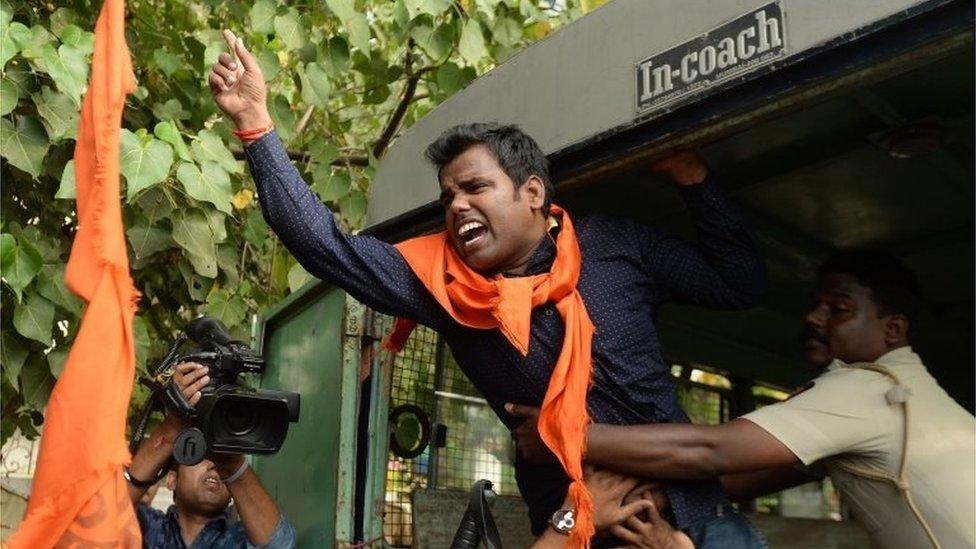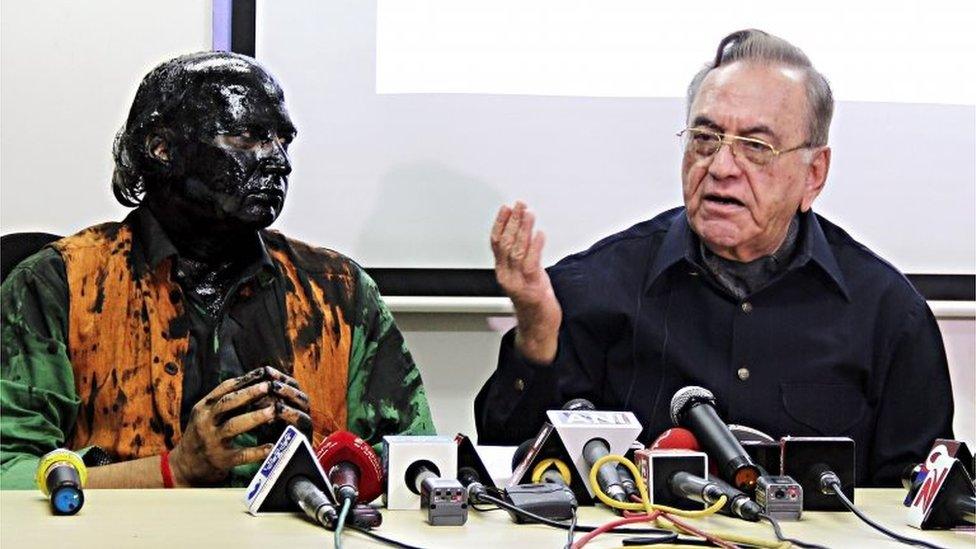'Intolerant India': Is criticism against Modi's BJP justified?
- Published

There have been protests against Bollywood star Aamir Khan's comments on intolerance in India
In recent weeks, actors, writers, academics and scientists have expressed concern over growing intolerance in India.
A movement that began with writers returning state awards has spread to scientists, historians and filmmakers. Some 200 academics teaching in India and abroad have issued a joint statement, external against rising "intolerance and bigotry.
Even Bollywood stars like Shah Rukh Khan and Aamir Khan have spoken on the issue. Opposition politicians have demanded a parliamentary debate on intolerance in the ongoing winter session.
They have cited the killing of rationalists MM Kalburgi and Govind Pansare, as well as the lynching of a man over suspicions he consumed beef, as examples of rising intolerance in the country.
However, many insist that India has suddenly not become intolerant under the Narendra Modi-led BJP government.
Books and films have been banned for as long as we can remember. Writers and artists have been hounded and threatened by political parties and groups across the country.
And as commentator Mukul Kesavan says, the main opposition Congress party does not exactly have a stellar record in defending liberal values., external
So is India seeing a new form of intolerance driven by majoritarian politics? Or, as analyst TN Ninan says, some of the intolerance is related to the "social churn linked to modernisation" of a complex nation?
Sanjay Subrahmanyam, external, who teaches in the US and France, is one of India's most distinguished and provocative historians and biographers. I spoke to him on whether he thought India had become intolerant under Mr Modi's watch.
Intolerance in India is not a new thing. So why are we suddenly so outraged and worried about what has been happening after the BJP government came to power last year?
I have not been in India for almost a year. So my impressions come from a distance.
However, it seems that the concerns stem from the fact that the BJP has such a massive majority in parliament, which may seem an occasion for them to impose their agenda in a way they could not in the period 1998-2004 [when the party was previously in power].
People would be less concerned if this was a coalition government.

Sanjay Subrahmanyam is one of India's most distinguished historians
Further, the current federal government speaks consistently with (at least) two voices.
One is more reasonable, reassuring and tolerant; the other more strident and aggressive.
This ingrained, almost structural, duplicity is being constantly refined as a strategy of "good cop, bad cop". It would seem natural to worry that this will become a pattern for the five years of this government.
Do you believe India has actually become more intolerant? Isn't it the case that Congress and many other non-BJP state governments don't have a leg to stand on, insofar as liberal values are concerned?
It is not a question of "India", but of the upper echelons of the political class and their attitudes.
It is true that "liberal values" have always been fragile in independent India. The BJP is not alone in the matter of attacking them. Few parties actually incarnate any real political liberalism.
But should that make the BJP immune to criticism?

Mr Modi says he is committed to 'work for the welfare of people of all sections and religion'
If I am being robbed by two pickpockets, is that any consolation? If the only criticism of the current political climate was politically motivated, and came from political parties with a murky past of their own (like the Congress), it would not be so much of an issue.
But it comes from many members of civil society who feel threatened, and when they protest in a non-violent way, they are told brutally to leave the country and go elsewhere. That is the crude language of majoritarianism. It is being felt in many institutions. My friends in the universities are also feeling it more and more.
So how different is that intolerance with this one under the BJP regime? Are we panicking too much?
There are certainly reasons for concern when a certain type of intimidation and bullying becomes a part of the normal language of public discourse.
The BJP is not the only group to do this, but they are the ones with the power in many parts of India.
If I lived in Pakistan, my concern would be with the Salafis; if I lived in France, it would be with the Front National, who also use a majoritarian language to say "either become French on my terms, or face the consequences".
This needs to be protested, just as the 1975 Emergency needed to be resisted, or Nandigram [killings], external needed to be protested. Why should we make an exception for the BJP's bullying?
How tolerant has India been as a civilisation?
As a historical space, India has been no more or less virtuous than any other part of the world.
Why do we also need to claim that we are better than everybody else? It is precisely because we are not, that we need to examine our own present as well as our past with a critical eye.
The student of Indian history finds no lack of violence of all sorts in the Indian past, whether based on religion, caste, colour, xenophobia, or political jockeying.

"As a historical space, India has been no more or less virtuous than any other part of the world."
There was never a "golden age" in India, despite what all stripes of myth-makers like to claim.
Yes, there were moments and spaces of toleration, or cosmopolitan coexistence. But these were actually interesting exceptions, not the rule.
- Published17 October 2015

- Published25 November 2015